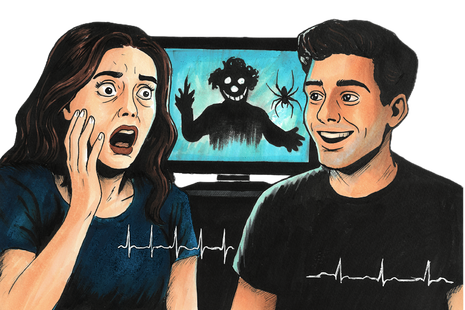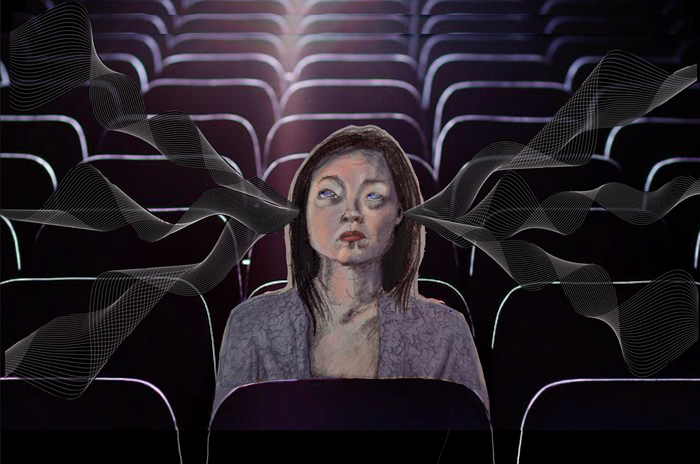Why do we enjoy horror films?
Lucy George breaks down the biology behind our fear response

I am terrified of spiders. And I’m not alone in this: almost half of the UK’s young adults suffer from arachnophobia, or are at least moderately scared of spiders. Whether it’s clowns, heights, or enclosed spaces, almost everybody is afraid of something. But why, and how, do we experience fear? And why do we actively seek out this feeling, particularly during Halloween, by watching horror films purposefully designed to make us afraid?
Fear is an emotion that serves an important purpose. When faced with a potentially life-threatening situation – for example, encountering a grizzly bear – a brain region known as the amygdala is activated. This generates the body’s ‘fight-or-flight’ response, causing a rapid increase in heart rate, blood pressure, and adrenaline levels in the bloodstream. These bodily changes prepare us to defend ourselves against danger by diverting blood flow to our heart and muscles, enabling us to either confront or escape the cause of our distress.
“These bodily changes prepare us to defend ourselves against danger”
While a bear encounter may understandably evoke our fear response, many phobias are unrelated to any significant risk of danger. Just 0.5% of the world’s spider species are known to have ever caused human deaths, yet the fear of spiders is incredibly common. One theory suggested to explain this is that their long legs, large abdomen, and hairiness all contribute to spiders appearing bigger than they truly are, inflating our perception of spiders as a genuine threat.
However, not all fears can be rationalised in this way. It seems like irrational phobias can develop for just about anything, including specific foods, words, celebrities, or even Halloween itself (known as samhainophobia). It’s thought that these phobias often stem from an unpleasant past experience through what’s known as ‘fear conditioning’: learning to associate something harmless with a negative outcome, similar to how dogs became conditioned to drool at the sound of a bell when expecting treats in Pavlov’s famous experiments. Fear conditioning leads to greater amygdala activation when facing the same stimulus in the future, creating an intense, emotional fear response to things that pose no threat. Moreover, research has suggested that the risk of developing specific phobias may be partly linked to our genetics, although this is still poorly understood.
“After the intensity of a frightening horror film, making it to the end can feel incredibly rewarding”
A recent survey revealed that 91% of Generation Z consumed horror films or TV shows in 2024, with over a quarter of respondents purposefully watching this genre to elicit the feeling of fear. If fear evolved to protect us from danger, then why do we intentionally seek it out by watching scary movies?
Horror films can trigger the same adrenaline rush as coming face to face with a predator: heightened senses, rapid breathing, and a pounding heartbeat all contribute to the immersive experience that many people find invigorating. Stephen King’s It (2017) – the highest-grossing horror movie of all time – has its fair share of heart-stopping moments, with a grand total of 23 jump scares to exhilarate viewers with a surge of adrenaline.
After the intensity of a frightening horror film like It, making it to the end can feel incredibly rewarding, both mentally and physically. Known as the body’s natural painkillers, endorphins are chemicals released by the brain when we experience fear and stress, or when we take part in pleasurable activities such as eating nutritious food. These feel-good chemicals may be another reason why we find horror so compelling, and why many people can’t stay away from horror movies, for the same reason we keep returning to our favourite foods and restaurants.
Differences in personality may help to explain why horror is so divisive. Studies have shown that people regarded as ‘sensation-seekers’, with a strong desire to take part in new, exciting experiences, are more likely to enjoy the emotional and physical response evoked by horror films. These people also tend to show higher levels of morbid curiosity, defined as a particular interest in topics such as death and the paranormal. In contrast, individuals with higher empathy are thought to enjoy horror movies less, providing one potential explanation as to why not everybody can stomach this genre, aside from the inherent unpleasantness of the gore and blood often involved.
All of these findings are good news for both horror lovers and haters alike. Regardless of our opinion on the genre, we can all be thankful for the remarkable survival mechanisms that have evolved to protect us from perceived danger – whether this is in the form of bears, spiders, or killer clowns. So, the next time you get frightened at the sight of a spider, or shocked by a horror movie jump scare, take a moment to be grateful for your fear response.
 News / Colleges charge different rents for the same Castle Street accommodation2 March 2026
News / Colleges charge different rents for the same Castle Street accommodation2 March 2026 News / News in Brief: waterworks, wine woes, and workplace wins 1 March 2026
News / News in Brief: waterworks, wine woes, and workplace wins 1 March 2026 News / Climate activists protest for ‘ethical careers policy’1 March 2026
News / Climate activists protest for ‘ethical careers policy’1 March 2026 News / Private school teacher who lied about Cambridge degree barred from teaching27 February 2026
News / Private school teacher who lied about Cambridge degree barred from teaching27 February 2026 News / Angela Merkel among Cambridge honorary degree nominees27 February 2026
News / Angela Merkel among Cambridge honorary degree nominees27 February 2026









